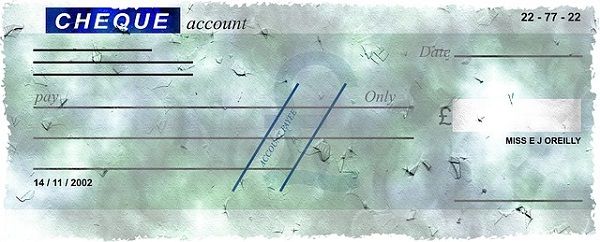 Cheque refers to a bill of exchange, which contains an unconditional order to the bank to pay the specified sum from your bank account. There are two kinds of cheques which are commonly misunderstood are stale cheque and post-dated cheque. A stale cheque is one which cannot be honoured because the reasonable period is expired. As against, a post-dated cheque is a cheque which is drawn today but contains a future date for payment.
Cheque refers to a bill of exchange, which contains an unconditional order to the bank to pay the specified sum from your bank account. There are two kinds of cheques which are commonly misunderstood are stale cheque and post-dated cheque. A stale cheque is one which cannot be honoured because the reasonable period is expired. As against, a post-dated cheque is a cheque which is drawn today but contains a future date for payment.
Primarily, there three parties to a cheque, drawer – who draws the cheque on his bank account, payee – to whom the cheque is payable, i.e. the beneficiary, and drawee – the bank. The other parties involved in the case of cheques are endorser – the one transferring his right for payment to another, and endorsee – the one to whom the right is conferred. In this article, you will get to know the difference between stale cheque and post-dated cheque.
Content: Stale Cheque Vs Post Dated Cheque
Comparison Chart
| Basis for Comparison Chart | Stale Cheque | Post-Dated Cheque |
|---|---|---|
| Meaning | A stale cheque is one which is outstanding for a period more than 3 months from the issue date. | A post-dated cheque is a valid cheque which a banker honors only when the date it bears arrives. |
| Date | Past Date | Future Date |
| Honour | It cannot be honored. | It can be honored, only when the date on the cheque has arrived. |
Definition of Stale Cheque
Stale Cheque refers to a cheque which is expired because it is held by the payee for too long. So, it cannot be honoured and is of no use to the payee.
In finer terms, a stale cheque is one that is presented for payment by the payee, at the drawee bank for encashment, but not accepted by the bank, because it is presented after the reasonable period, i.e. three months (earlier it was six months) of its date of payment. These cheques bear a date in the past, on which the cheque is written, and so the bank is not obligated to honour such cheques.
Definition of Post-Dated Cheque
Post-dated cheque as the name implies is a cheque that carries a later date. It is a cheque issued at any point in time by the drawer but contains a future date, i.e. the paying bank will accept the cheque for honour or encashment if it is presented after passing or arrival of the date specified on the cheque. It is mainly used when you want to make payment at a later date.
The encashment of a post-dated cheque before the stated date varies from country to country. In several countries, post-dated cheques can be presented for payment any time, while in some countries these cheques are not honoured until the date stated on the cheque.
Key Differences Between Stale Cheque and Post Dated Cheque
The difference between stale cheque and post-dated cheque, are presented in the points below:
- The stale cheque is one that was drawn long ago and not presented for payment within a reasonable time, i.e. three months from the date mentioned in the cheque. The post-dated cheque is the cheque on which a date is written by the drawer which is later than a present date, and can be honoured only when the date arrives.
- A stale cheque contains a date, i.e. three months or more, in the past. On the other hand, a post-dated cheque contains a future date.
- A post-dated cheque cannot be accepted or honoured earlier than the date mentioned on the cheque, whereas a stale cheque is not honoured at all.
Example
Stale Cheque
Suppose a cheque is drawn on 4th April 2019, then it will be valid up to 3 months from the date of issue, i.e. 3rd July 2019. If the cheque is presented after a reasonable time, then it cannot be encashed, because the banks dishonour such cheques. These cheques are called stale cheques.
Post Dated Cheque
Suppose a cheque issued on 4th April 2019 but the date mentioned on it is 19th April 2019. One can encash such a cheque, on or after 19th April 2019 and not before it. These type of cheques are called post-dated cheques.
Conclusion
So, the difference between a stale cheque and a post-dated cheque lies in the date mentioned on the cheque, i.e. if the date borne by cheque is yet to come, then it is called as a post-dated cheque, whereas stale cheque is a cheque which is not presented for payment within three months of the date, it bears.






pcd india says
Thanks for sharing. I will try to implement these methods on my blog. Thanks for sharing. Keep updating us.
Shine says
It is a great blog post. I always read your blog, it’s helpful and informative. I like it, thanks for sharing this information with us